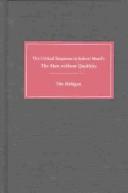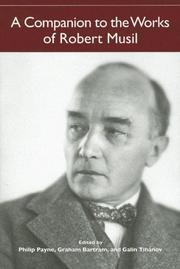| Listing 1 - 4 of 4 |
Sort by
|

ISBN: 1571131175 9786611862817 1281862819 1571136150 9781571136152 9781571131171 Year: 2003 Publisher: Suffolk Boydell & Brewer
Abstract | Keywords | Export | Availability | Bookmark
 Loading...
Loading...Choose an application
- Reference Manager
- EndNote
- RefWorks (Direct export to RefWorks)
The Austrian writer Robert Musil ranks among the foremost novelists of the 20th century. Despite a series of lesser but well-regarded shorter works, his literary reputation rests almost entirely on his novel 'Der Mann ohne Eigenschaften' (The Man without Qualities), a life-work in the truest sense, which became the focus of all his energies and thinking from 1924 until his death in 1942. This study analyzes the principal trends in scholarship on the novel from the 1960s to the present. It contrasts earlier criticism, which foregrounded the eponymous central character's search for identity against the background of subject theory or mysticism, with more recent criticism, which has focused on aesthetic and ethical approaches to the novel within the broader context of theories of value. A focal chapter in the study centers on the persistent difficulty critics have encountered with the idea of 'Eigenschaftslosigkeit', the state of being without qualities named in the novel's title. Tim Mehigan is Associate Professor of German and Head of the Department of Germanic Studies and Russian at the University of Melbourne.
Musil, Robert --- Musil, Robert, --- LITERARY CRITICISM / European / German. --- 20th Century. --- Aesthetics. --- Austrian Writer. --- Ethics. --- Identity. --- Literature. --- Robert Musil. --- The Man without Qualities.
Book
ISBN: 9781571135384 1571135383 9781571138392 1571138390 1283836459 Year: 2012 Publisher: Rochester : Camden House,
Abstract | Keywords | Export | Availability | Bookmark
 Loading...
Loading...Choose an application
- Reference Manager
- EndNote
- RefWorks (Direct export to RefWorks)
Robert Musil, known to be a scientific and philosophical thinker, was committed to aesthetics as a process of experimental creation of an ever-shifting reality. Musil wanted, above all, to be a creative writer, and obsessively engaged in almost endless deferral via variations and metaphoric possibilities in his novel project, The Man without Qualities. This lifelong process of writing is embodied in the unfinished novel by a recurring metaphor of self-generating de-centered circle worlds. The present study analyzes this structure with reference to Musil's concepts of the utopia of the Other Condition, Living and Dead Words, Specific and Non-Specific Emotions, Word Magic, and the Still Life. In contrast to most recent studies of Musil, it concludes that the extratemporal metaphoric experience of the Other Condition does not fail, but rather constitutes the formal and ethical core of Musil's novel. The first study to utilize the newly published Klagenfurt Edition of Musil's literary remains (a searchable annotated text), The World as Metaphor offers a close reading of variations and text genesis, shedding light not only on Musil's novel, but also on larger questions about the modernist artist's role and responsibility in consciously re-creating the world.
Metaphor in literature. --- Musil, Robert, --- Art. --- Literary Analysis. --- Living and Dead Words. --- Metaphor. --- Modernist Literature. --- Other Condition. --- Philosophy. --- Reality. --- Robert Musil. --- Still Life. --- The Man without Qualities. --- The World as Metaphor in Robert Musil's The Man without Qualities. --- The World as Metaphor. --- Utopia. --- Word Magic. --- artistic creation. --- literary remains. --- metaphoric experience. --- metaphoric possibilities. --- modernist artist. --- modernist literature. --- re-creating the world.

ISBN: 1571131108 9781571131102 9781571136879 1571134530 1571136878 Year: 2023 Publisher: Rochester, New York Camden House
Abstract | Keywords | Export | Availability | Bookmark
 Loading...
Loading...Choose an application
- Reference Manager
- EndNote
- RefWorks (Direct export to RefWorks)
The analyses in this title are embedded in an appreciation of the intellectual context's of Musil's writing, yielding fresh insights into his artistic accomplishment and his place in the Austrian and German traditions of the 20th century.
Musil, Robert, --- Critique et interprétation --- Criticism and interpretation --- Criticism and interpretation. --- Musil, Robert --- Critique et interprétation. --- Musel, Robert, --- Muzilʹ, Robert, --- Музиль, Роберт, --- LITERARY CRITICISM / European / German. --- 20th Century. --- Austrian Novelist. --- Consciousness. --- Gender. --- German Culture. --- Intellectual. --- Modernist German Prose. --- Morality. --- Psychological Insight. --- Robert Musil. --- Stylistic Innovation. --- The Man without Qualities.
Book
ISBN: 0691610096 1400858305 9781400858309 Year: 2014 Publisher: Princeton, NJ
Abstract | Keywords | Export | Availability | Bookmark
 Loading...
Loading...Choose an application
- Reference Manager
- EndNote
- RefWorks (Direct export to RefWorks)
Virtue, as used here, connotes integrity--that living force that issues from persons, societies, or texts in consequence of their accomplishing their distinctive ends. Professor Berthoff outlines the descent of the intuition of virtue from classical times into our own era and examines it as a formative presence in a series of major literary works.Originally published in 1987.The Princeton Legacy Library uses the latest print-on-demand technology to again make available previously out-of-print books from the distinguished backlist of Princeton University Press. These editions preserve the original texts of these important books while presenting them in durable paperback and hardcover editions. The goal of the Princeton Legacy Library is to vastly increase access to the rich scholarly heritage found in the thousands of books published by Princeton University Press since its founding in 1905.
Virtue in literature. --- Ethics in literature. --- Literature --- Didactic literature --- Literature and philosophy --- Philosophy and literature --- Philosophy. --- History and criticism --- Theory, etc. --- Theory --- Ad hominem. --- After Virtue. --- Allegory. --- Analogy. --- Anecdote. --- Antithesis. --- Apologue. --- Assonance. --- Bildungsroman. --- Chivalric romance. --- Consummation. --- Contingency (philosophy). --- Courtly love. --- Criticism. --- D. H. Lawrence. --- Dictionnaire philosophique. --- Eloquence. --- Epigram. --- Epigraph (literature). --- Fabliau. --- Fiction. --- Figure of speech. --- Fine art. --- Flattery. --- Form of life (philosophy). --- Fortinbras. --- French moralists. --- G. (novel). --- Grandiosity. --- Hedonism. --- Hermeticism. --- Heroic couplet. --- Heroic drama. --- Heroic verse. --- Historicism. --- Idealization. --- Indulgence. --- Intentionality. --- Internal rhyme. --- Irony. --- Irving Babbitt. --- Italo Svevo. --- Karl Kraus (writer). --- Libertine. --- Literary nonsense. --- Literature. --- Memoir. --- Modernism. --- Mutability (poem). --- Narcissism. --- Narrative. --- Negative capability. --- Novel. --- Novelist. --- Of Education. --- On Truth. --- Opportunism. --- Originality. --- Phrenology. --- Poetry. --- Polonius. --- Positivism. --- Pragmatism. --- Precaution (novel). --- Pride. --- Prose. --- Proverb. --- Quixotism. --- Robert Musil. --- Romanticism. --- Rosicrucianism. --- Satire. --- Scholasticism. --- Self-Reliance. --- Sensibility. --- Soliloquy. --- Solipsism. --- Stendhal. --- Superiority (short story). --- Symbolism (arts). --- Synecdoche. --- Søren Kierkegaard. --- The Book of Thel. --- The Charterhouse of Parma. --- The Counterfeiters (novel). --- The Man Without Qualities. --- The Philosopher. --- The Sacred Fount. --- Theodore Dreiser. --- Theory of Forms. --- Truism. --- Ulrich. --- V. --- Verbosity. --- Vocation (poem). --- W. B. Yeats. --- What Is Literature?. --- William Shakespeare. --- Writing.
| Listing 1 - 4 of 4 |
Sort by
|

 Search
Search Feedback
Feedback About UniCat
About UniCat  Help
Help News
News